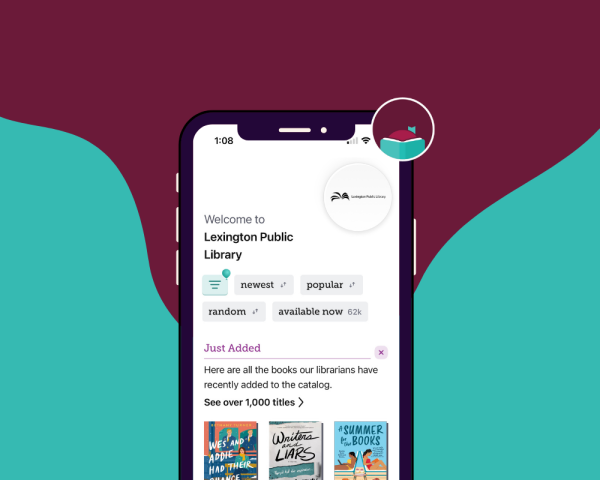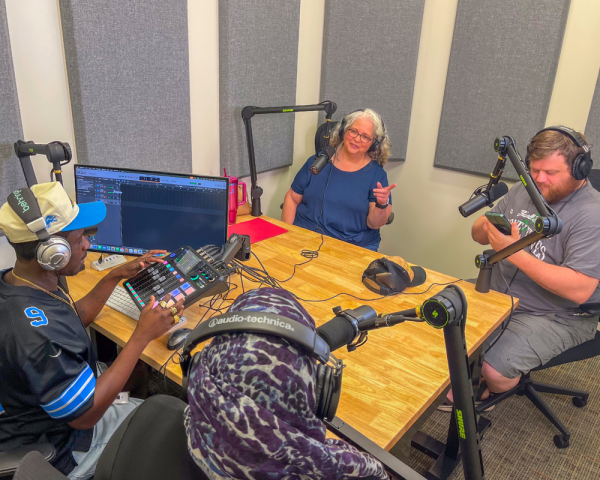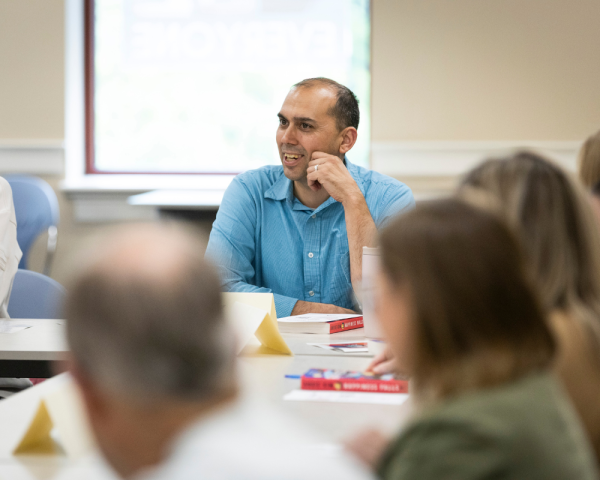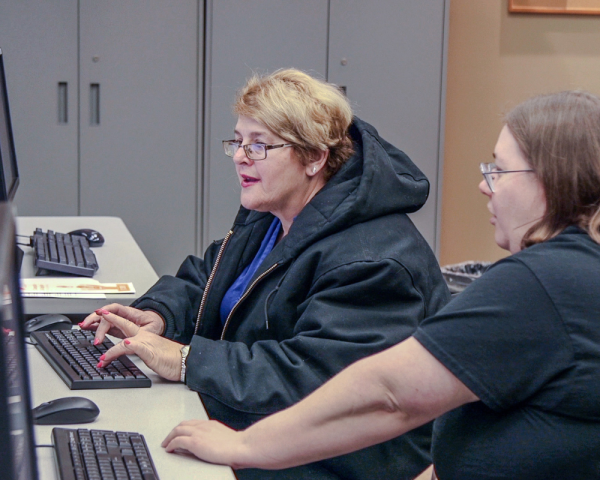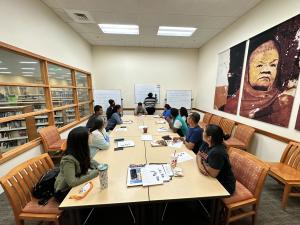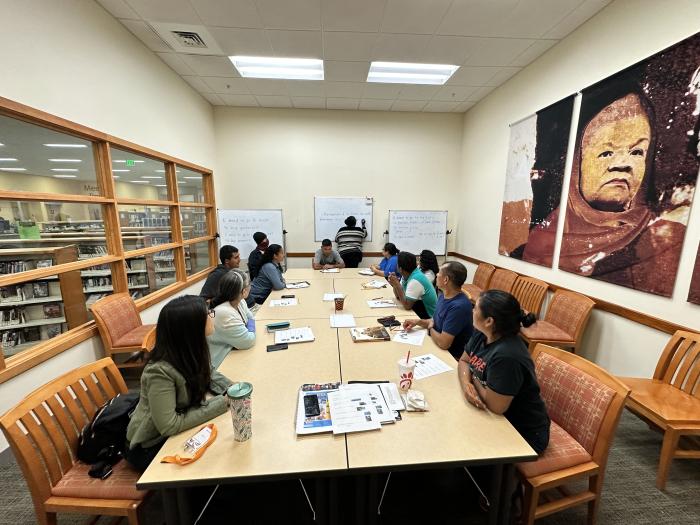

Website Search
Beginning English classes are held twice weekly to help participants improve English language reading, writing, listening and speaking skills. Classes are held on Tuesday and Thursday evenings. Classes and class materials are free to everyone. Participants can practice their new skills at any of our ESOL conversation group meetings. Questions: Email abell@lexpublib.org.
Beginning English classes are held twice weekly to help participants improve English language reading, writing, listening and speaking skills. Classes are held on Tuesday and Thursday evenings. Classes and class materials are free to everyone. Participants can practice their new skills at any of our ESOL conversation group meetings. Questions: Email abell@lexpublib.org.
Beginning English classes are held twice weekly to help participants improve English language reading, writing, listening and speaking skills. Classes are held on Tuesday and Thursday evenings. Classes and class materials are free to everyone. Participants can practice their new skills at any of our ESOL conversation group meetings. Questions: Email abell@lexpublib.org.
Beginning English classes are held twice weekly to help participants improve English language reading, writing, listening and speaking skills. Classes are held on Tuesday and Thursday evenings. Classes and class materials are free to everyone. Participants can practice their new skills at any of our ESOL conversation group meetings. Questions: Email abell@lexpublib.org.
Beginning English classes are held twice weekly to help participants improve English language reading, writing, listening and speaking skills. Classes are held on Tuesday and Thursday evenings. Classes and class materials are free to everyone. Participants can practice their new skills at any of our ESOL conversation group meetings. Questions: Email abell@lexpublib.org.
We stand for free and open access to information. That starts with removing unnecessary barriers to our educational resources and technology. The Lexington Public Library no longer charges fines or fees for late, lost, or damaged material.
Accessibility information for each of our locations, including parking, elevators, and restrooms.
This is your gateway to our most popular resources. Search for books and eBooks, access tools for research and learning, and discover our unique collection of genealogy and local history materials.
Everyone deserves a place to discover something new. The Lexington Public Library stands for free and open access to information. We’re a safe, welcoming space for neighbors to come together — opening the door so all Lexingtonians can find what they’re looking for.
Lexington, Kentucky (December 20, 2022) – Lexington Public Library announced today that its popular LPL After School program will return in 2023, beginning January 2.
LPL After School is a FREE drop-in program for kids aged 5-12 that takes place after regular school hours, Mondays through Fridays from 4-6pm. The Library, in partnership with God’s Pantry, will provide snacks for all participants as well as STEAM and enrichment activities, homework help, and reading recommendations. And there’s no need to register—just show up!
Lexington, Kentucky (March 9, 2022) – Lexington Public Library and Lexington Public Library Foundation are honored to announce that the Marksbury Family Foundation has committed the lead gift for the capital campaign to rebuild the library branch at the corner of Versailles Road and Village Drive. In recognition of their generosity, the new facility will be named the Marksbury Family Branch when it opens in 2024.
Melissa Coulston is Partnership Coordinator at Kentucky Refugee Ministries Lexington, where she has worked since 2022. Her role at KRM involves wearing many different hats depending on the day, but she primarily works to engage central Kentucky communities to support KRM's work to welcome forcibly displaced newcomers. Prior to her work in refugee resettlement and newcomer welcome, Melissa served in various positions in academic, public, and government libraries in Kentucky and South Carolina.
Compiled by Cyrus Parker Jones, a man formerly enslaved by the Parker family, these funeral notices cover 667 funerals of individuals in Lexington, including seven free blacks. The funeral notices cover the years 1806-1886. Jones donated his collection to a trustee of the Lexington Public Library prior to his death in 1887, who then added some notices and donated the collection to the Lexington Public Library in 1900.
The Daily Lexington Atlas ran from late 1847 through early 1849 and was Lexington’s first daily paper, and the first to publish information from the telegraph lines. It is described by William Perrin in his 1882 History of Fayette County Kentucky as a “red-hot Whig and fiery southern” publication. It contains some articles and editorials that are overtly racist, as the editors favored slavery, then emancipation only if the freed African Americans were immediately sent to Liberia. It covers the 1848 presidential election and the local election for Kentucky Governor. Perrin claims the paper had an extensive subscriber list, but had to “give up the ghost after several months disastrous experience” due to the expense of the paper.
The Elmer L. Foote Collection is a group of 190 lantern slides. They were created by Elmer L. Foote, a Cincinnati photographer and library staff member whose pictures appeared in the Cincinnati Commercial Tribune.
Letters to and from Father William T. Punch (1874-1933). Father Punch was instrumental in building the 3rd St. Peter Catholic Church on Barr Street in Lexington, KY.
The 1906-07 Lexington cross directory contains residential and business information for the city, arranged both alphabetically and by street, with a business listing by category. It also contains city officials and departments, and basic historical and landmark information. The advertising section is printed on yellow paper.
The city report covers the outline of a citizen participation work plan and its connection with neighborhood groups, as well as the results of those meetings and community concerns that took place throughout 1969. It contains neighborhood maps, images of news articles, and and project methodology.
This letter collection was collected by Judge Kenneth Lyons. The earliest date of the letters is 1862, from Bourbon and Nicholas Counties, Kentucky. Some letters are fragments.
The diary (ca. 1899) of Katherine Pettit, details her settlement work for the Kentucky Confederation of Women's Clubs, made yearly trips to Hazard during this period and was a central figure in establishing the Hindman (Kentucky) Settlement School in 1902. Activities described here include teaching, reading, cooking, and hygiene. The diary also includes daily entries (August 3-September 13) detailing Pettit's travel from Lexington and Hazard with fellow settlement workers, her encounters with Hazard and mountain families, and the general scope of her work. Also includes a manuscript map of her camp.
The Kentucky Gazette was the first paper established west of the Allegheny Mountains. The frontier paper focused on East Coast and International news, though some local announcements can be found. Later, the paper focused on disseminating opinions on politics and issues of concern on the frontier. When political parties emerged, the paper developed a Democratic (conservative at the time) bent.
The Lexington Weekly Press was published every Wednesday in Lexington, Kentucky, and contained local, state, and foreign news. The paper focused on Central Kentucky’s “agriculture, manufactures and fine stock”, as well as literary and scientific news, market reports, and serial stories. Local weddings, deaths, community events, and elections for Lexington and the surrounding region. The paper was sent anywhere in the United States at a cost of one dollar per year.

